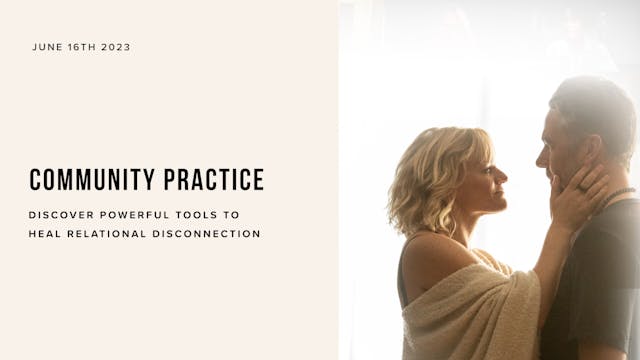Teaching - Imago Intentional Dialogue
Repair Past Resentments
•
36m
In order to create a healthy foundation in a relationship, we must have clear containers for communication, especially when it comes to working through conflict, projections, judgments, withholds, and even disagreements. This first assignment offers you a practice that you can use throughout the duration of the program, and hopefully, beyond!
The Intentional Dialogue is a nonviolent communication practice that comes out of the Imago work of Harville Hendrix and Helen LaKelly Hunt, authors of Getting the Love You Want. The foundational principle of the practice is that you agree not to make the other person wrong, so it creates a safe container to express & be heard in whatever you’re feeling.
When you don't truly listen to one another, you can create chronic patterns of confusion and hurt in your relationship. Then unconscious childhood programming will play out in your relationship if you don’t create containers to express it in a safe way. This can be a life-changing spiritual practice if you stick with it. It will expand your capacity to hear and express upset with empathy and compassion.
In the everyday nature of your relationship, Partner A will say to Partner B, “I have something I want to share with you. Can we have an Intentional Dialogue?” If Partner B is not available for it right away, they will offer another time when they can be fully present to hold Partner A. Harville Hendrix states that you have to be willing to do it within 24 hours, and we agree with this.
In the case of this assignment, it is best that you schedule two 30-60 minute time slots each week to do the practice. Arrive to the practice prepared for both of you to play both roles. Have something to share in the Dialogue (even if it seems small or insignificant!) and be prepared to listen & hold the container for your partner.
Here is the practice:
Step 1: Reflective Listening:
Partner A states what’s on their mind. Try to be as concise as you can.
Partner B repeats word-for-word. If they don’t get an exact word, they can say, “You didn’t quite say it this way, but this is what I heard…”
Then Partner B asks, “Did I get it?” If No, Partner A repeats and Partner B tries again. If Yes, Partner B ask, “Is there more?” Process continues until the response to “Is there more?” is "No."
Step 2: Validate:
Partner B says, “That makes sense.” And might give examples.
Note for Partner B: It may come up in your practice that you may disagree with what Partner A shares. This is normal, so don't be concerned if it comes up for you. This step is about suspending your personal experience to let Partner A feel fully heard in their experience. You will have an opportunity to express and be heard in your truth when you switch roles.
Step 3: Empathize
Partner B puts themselves in Partner A’s shoes. “I can imagine that when I…, you would feel…”
After Partner B completes, they ask, “ Did I get it?" and "Is there anything that I missed that you would’ve wanted me to say or acknowledge?”
If you plan to switch roles for Steps 1-3, do this before moving on to Step 4.
Step 4: Praise:
Partner B praises Partner A for 90 seconds. Then Partner A praises Partner B for 90 seconds.
Approach this practice in the spirit of generosity. Safely expressing and being heard in what's true can be deeply healing in any relationship. It is a gift. To that end, don't interrupt your partner when they’re sharing. Be aware of how much energy you’re bringing to your own sharing and whether your partner can fully metabolize it. And keep your feeling body active, so that you stay sensitive to your partner the entire time.
Up Next in Repair Past Resentments
-
Writing the mother letter or father l...
-
Teaching - The Power of Reconciliation
If you look back through your past, you will inevitably find that you have hurt others, and that you have been hurt by others. This is particularly true in romantic relationships. We can choose to let history remain, or we can actively shift the karma we have created within past relationships. Re...
-
Community Practice: Discover Powerful...



